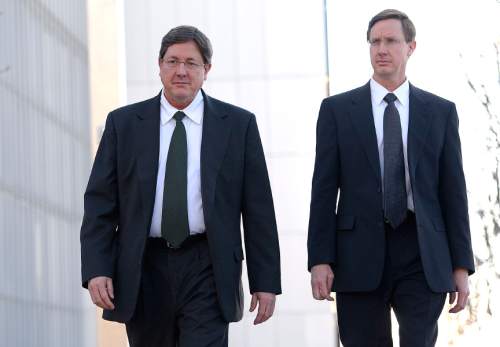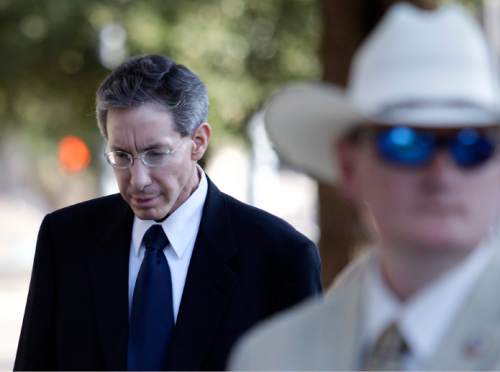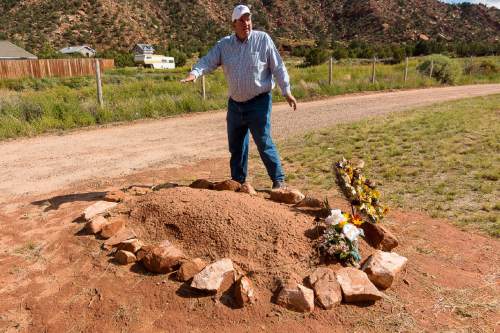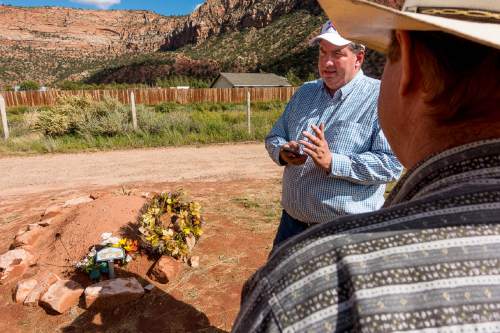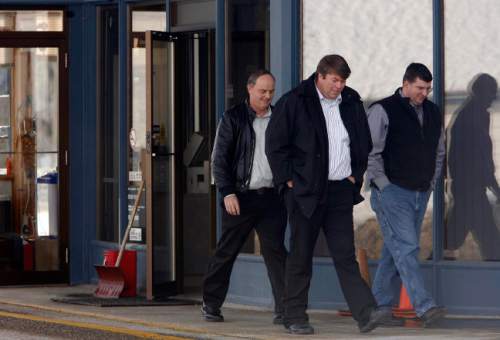This is an archived article that was published on sltrib.com in 2016, and information in the article may be outdated. It is provided only for personal research purposes and may not be reprinted.
Phoenix • Fundamentalist Church of Jesus Chris of Latter-Day Saints leader Warren Jeffs receives as much as 300 letters per day, a Texas prison employee testified Monday in the civil rights trial against Hildale, Utah, and Colorado City, Ariz.
That figure is lower than when Jeffs arrived in 2011 at the prison in Palestine, Texas. In the first few weeks or months there, Jeffs was receiving 1,000 to 2,000 letters per day, testified Jennifer Smith, who oversees inmate mail for the Texas prison system.
The Justice Department called on Smith to authenticate two letters Jeffs received in 2012 from then-Colorado City Mayor George M. Barlow, who went by George M. Allred in the letters. The FLDS practice polygamy, and followers sometimes don't use their legal names if their mothers have became the spiritual wife of a new husband.
Smith also authenticated a letter Jeffs received in 2013 from Curtis Cooke, a deputy marshal in Hildale and Colorado City, collectively known as Short Creek.
In the letters, which were in the court record before the trial started, Barlow and Cooke expressed their loyalty to Jeffs. Cooke described his family life to Jeffs while Barlow asked Jeffs for counsel about some town business, including whether to change Colorado City's legal name to Short Creek.
The Justice Department alleges the towns and their police collude with the FLDS Church to discriminate against nonmembers. Neither Jeffs nor the church is a party in the lawsuit.
Monday was the third day of testimony. U.S. District Judge H. Russel Holland ended court for the day after Smith's testimony, about 11:30 a.m., when one male juror complained of illness. The trial is set to resume Tuesday at 9 a.m.
Smith's testimony offered rare insight into Jeffs' life in prison, where he is serving a sentence of life plus 20 years for crimes related to marrying underage girls. The Texas prison system has been guarded about Jeffs and whether it takes any special steps to monitor him.
Smith said Jeffs receives between 30 and 300 letters a day. The remainder of the Palestine facility's population gets about 2,000 pieces of mail per day.
Smith said the prison had to come up with a special mail delivery system for Jeffs because of the volume and because he didn't want to read all the letters.
A prison employee goes to him daily and reads the names of the senders to Jeffs, who decides which letters he wants to read. Those letters are then inspected by prison staff before being given to Jeffs.
If he does not want to read a letter, it is put in storage with his personal property; family can pick it up when they come to visit him.
"He receives an enormous amount of mail, especially when he was first incarcerated," Smith testified.
Jeffs "doesn't send that many" letters, Smith said — only five or six a week.
Smith said the prison inspects incoming and outgoing mail for contraband, threats and gang information. The staff also can refuse to send or deliver mail if it is illegible or makes no sense. Such correspondence could be code, she explained.
A few of Jeffs' outgoing letters have been halted because they were illegible, Smith said, though she didn't specify whether they were found to be in code.
During cross-examination from Colorado City attorney Jeff Matura, Smith said the prison never saw Jeffs reply to Barlow or Cooke. Matura also ran through a list of other people elected or appointed to positions in the towns and asked Smith whether the prison had intercepted letters between Jeffs and those people. Smith said no.
Earlier in the morning, FBI Supervisory Special Agent Robert Foster finished testimony he began last week. Foster discussed the 2005 and 2006 manhunt for Jeffs, and letters and documents the FBI intercepted.
One ledger the FBI obtained showed FLDS members who had given tithing to the church. Men who were then marshals in the towns' police force were listed.
"Do you belong to a church?" Matura asked Foster during cross-examination.
"Yes," Foster replied.
"Do you tithe?"
"Probably not as much as I should, but, yes."
"Does that impact how you do your job as an FBI agent?"
"No."
The four-week trial began last week.
Twitter: @natecarlisle


